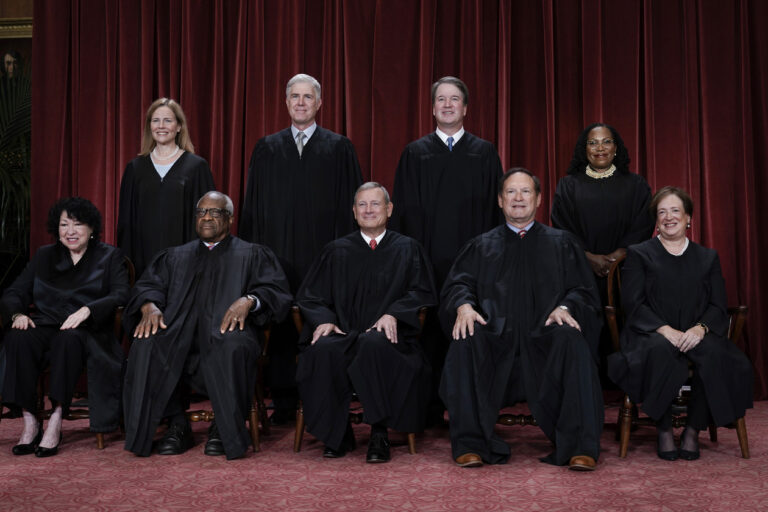The dream of Black lawyers in America
Say It Louder

Zoe Polk is head of the East Bay Community Law Center
Cherelle Griner was a third-year law student when her legal trajectory changed forever. In February 2022, she was notified that her wife, WNBA basketball star Brittney Griner was arrested and detained by Russian officials on smuggling charges. For the next 294 days, Cherelle Griner would summon all of her lived and professional experiences to advocate for her wife’s freedom. In what she later would describe as the “darkest moments of her life,” she had to watch from a distance as her 6’9″, unapologetically Black, queer, loved one was perp-walked and globally shamed by the Russian criminal system. And she again had to watch as the judge issued her wife a nine-year sentence to a penal colony and denied Brittney Griner’s appeal.
In these moments, she was confronted with the cruel reality of the Black Lawyer American Dream.
My parents, like many Black parents that descended from the Jim Crow and civil rights era, advised me that there were only two career paths: doctor or lawyer. While they acknowledged the lucrative possibilities in these professions, they emphasized the freedom that would accompany them. They believed these jobs could prevent much of the suffering that Black women endure due to systemic racism. So our family plunged into educational debt. We hoped we would have tangible and intangible returns on this investment, including lives free from incarceration, police violence, health discrimination and the systems built to destroy Black lives. Unfortunately, that dream was not our reality.
Read the story on Ms Magazine
I chose to compete as my true, trans self
More of This

The first time I remember feeling different from the people around me was in fourth grade. I felt like I’d been thrust onstage for a show without having been given a script. Every interaction seemed wrong. Recognizing my bisexuality in seventh grade gave me a degree of comfort, like a candle held out against dark confusion, but even then, so much of myself still felt impossible to discern.
Despite growing up in progressive California, it wasn’t until eighth grade that I met a trans person. He put words to feelings I hadn’t been able to name for myself, like how out of place he felt in his own skin or to be perceived as a girl. After reading other people’s stories of realization online, I was certain enough that I was trans to tell my mom that I was her son, not her daughter.
Read the story on NY Times
The Supreme Court Justices don’t seem to like each other
Less of This

Supreme Court justices often get cross with lawyers arguing cases before them. But six months after the Court overturned Roe v. Wade, the justices are betraying signs of impatience and frustration with one another—sometimes bordering on disrespect. The Court has seen acrimony in its history, such as the mutual hostility among four of Franklin D. Roosevelt’s appointees. More recently, there have been reports of justices’ annoyancewith Neil Gorsuch, and Sonia Sotomayor took the unusual step of publicly tamping down speculation of a dustup over his decision not to wear a mask during the Omicron wave a year ago. For decades, though, peace has mostly prevailed.
Justices of sharply different legal views have been dinner-party friends, skeet-shooting pals, and opera companions. Ketanji Brown Jackson’s predecessor, Stephen Breyer, and Clarence Thomas—ideological opposites but quite friendly—would whisper and tell jokes during oral arguments. The one-liners and jibes of Antonin Scalia, the ornery conservative, drew laughs from his conservative and liberal colleagues alike. As Ruth Bader Ginsburg grew frail in her final year, Thomas would offer his arm to ease her descent from the bench. Rancor has always animated the justices’ opinions, but it was limited to pen and paper. On the bench, civility reigned.
Not anymore.
Read the story on The Atlantic
The conservative legal movement’s assault on regulations continues
Speaking Of...

For many judicial conservatives, the last 90 years have been an aberration: The New Deal catalyzed an enormous — malign, in their view — growth in the federal government. Lost in the regulatory jungle, they claim, is a “constitution in exile” that will emerge only when the excesses of the federal administrative state are pruned away.
It’s a powerful vision. At least it is for the firms who must follow federal health, environmental or securities law. It’s less attractive if you bear the costs of financial crisis or environmental catastrophe. But the Roberts Court has been firmly on the side of those being regulated. The court’s interventions have cut deep into the regulatory state in recent years, yet none has struck a body blow to any federal agency, let alone to the coordinating role played by the federal government in steering the national economy. That may be about to change.
Read the story on Politico
Pathways to Law Summit
February 10-11

The Annual Pathways to Law Summit provides an opportunity for law practitioners, educators and students to come together and exchange strategies, make connections, and participate in panels and other activities that help promote diversity in the legal profession.
Register








